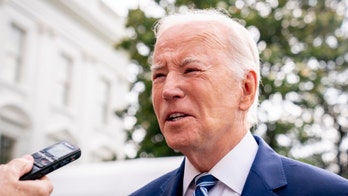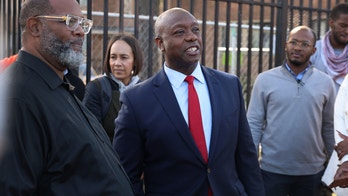
394677 03: Lights, fences, and barren land create an erie no man's land between the Tijuana, Mexico neighborhood of Colonia Libertad (R) and the U.S., September 19, 2001 east of San Ysidro, CA. Operation Gatekeeper's border crackdown of recent years has created the prison-like appearance and has made the border easier to defend against possible terrorist crossings. (Photo by David McNew/Getty Images) ((Photo by David McNew/Getty Images))
Republican lawmakers plan to propose an alternative to the “big, beautiful, powerful wall" along the U.S.’s southern border with Mexico that president-elect Donald Trump touted during his campaign, congressional aides said.
According to Reuters, numerous GOP lawmakers hope to sit down with Trump to discuss a less costly option to the president-to-be’s plan to build a wall along the U.S.’s roughly 2,000-mile long southern border.
Instead of an actual brick-and-mortar wall – which critics say is not only unfeasible and too expensive, but would also be ecologically disastrous – Republican lawmakers are pushing for double layers of fencing along parts of the border and the deployment of more federal agents to patrol the border.
A House Republican aide and a Department of Homeland Security official both told Reuters that Trump’s proposed border wall is not a realistic measure as it would block visibility for border agents on patrol and also cut through rugged terrain, over bodies of water and private land.
The House aide added that lawmakers are waiting for Trump's transition team to be put in place before setting a date for the meeting and broaching the subject.
Trump made his immigration proposals – the border wall as well as a call to deport 11 million undocumented immigrants – one of the hallmarks of his presidential campaign and stumped on the fears that undocumented immigrants took jobs from U.S. citizens and were a national security risk.
Despite heavy criticism from immigration activists, Democrats and even members of his own political party, the president-elect never wavered on his calls for the border wall. He asserted that the wall would not cost U.S. taxpayers any money because he would force Mexico to pay for the structure.
The election of Trump sent a wave of uncertainty through Mexico, despite the fact that President Enrique Peña Nieto has already said he is ready to work with Trump to advance the countries' relationship.
The United States is Mexico's largest trading partner and the North American Free Trade Agreement, which Trump has said he wants to re-negotiate, is the backbone of that commerce.
"The relationship of Mexico and the U.S. is uncertain," said Isidro Morales, of the Monterrey Institute of Technology and Higher Education. "Donald Trump is not a person of institutions. Surely it will be a unilateral policy worse than (George W.) Bush and we don't know what to expect."
The Associated Press contributed to this report.




